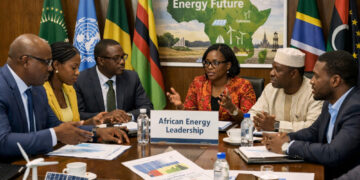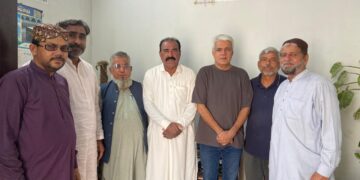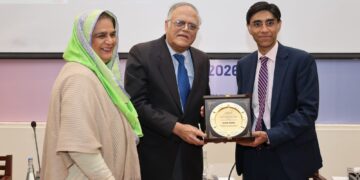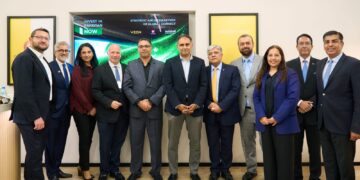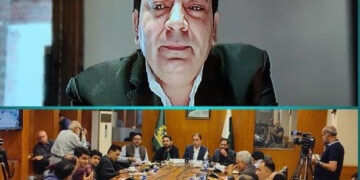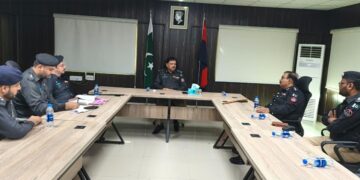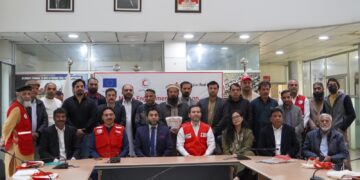?By Dr. Gholam Mujtaba, M.S., M.D., Ed.D., F.R.S.P.H.
USA : The inauguration of President Donald Trump has ushered in a new era of American foreign policy, introducing significant changes that diverge from the traditional strategies of previous administrations. The gap between words and actions in global diplomacy has long raised concerns; however, the new administration is showing that actions, not rhetoric, will define its policies. Within a month of taking office, President Trump has made notable strides in reshaping international relations, especially in the Middle East and the ongoing conflict in Ukraine.
Middle East: A New Approach to Peace
One of the most striking developments since President Trump took office is the significant de-escalation of conflicts in the Middle East. The war, which had engulfed various parts of the region, has seen a sharp decline in hostilities, providing much-needed relief to both Israeli and Arab populations. The Trump administration appears committed to realizing the Abraham Accords by fostering a two-state solution where Israel and Palestine can coexist peacefully. While words have played a role in diplomatic relations, it is clear that tangible actions—such as stopping hostilities—are what truly matter in forging a lasting peace.
Notably, there has been pushback from traditional Middle Eastern powers, including Saudi Arabia, Egypt, and Jordan, concerning the reconstruction efforts in Gaza. Despite dissenting voices in the U.S. Senate and House of Representatives, diplomatic negotiations and policy revisions are expected in the coming weeks. The global community increasingly yearns for stability in the region, aligning with President Trump’s agenda for lasting peace.
U.S.-Pakistan Relations and the Global Denuclearization Effort
One of the top priorities of the Trump administration is global denuclearization. While the methods for achieving this ambitious goal remain unclear, Pakistan finds itself at a critical juncture. The nation must decide whether to embrace democratic principles—including freedom of speech and the rule of law—or to align with regimes that have historically opposed U.S. policies. The geopolitical divide is evident: countries such as Afghanistan, Syria, Libya, Sudan, and Iraq, along with militant factions like Hezbollah and Hamas, have suffered as a result of policies that have isolated them from the global economy. In contrast, nations like Saudi Arabia, the UAE, and Qatar have established strategic partnerships with the United States, providing tangible benefits for their citizens.
Pakistan’s response to these dynamics will play a crucial role in shaping its relationship with the United States. The February 8 elections, which faced allegations of rigging, remain a controversial issue. The U.S. Congress, after examining discrepancies between Form 45 and Form 47, has voiced concerns regarding the legitimacy of the electoral process. While a non-binding resolution was passed during the Biden administration, the Republican-controlled Congress under President Trump is anticipated to adopt a stronger stance on promoting democratic transparency in Pakistan. Senator Marco Rubio, currently serving as Secretary of State, has previously raised alarms about these irregularities, indicating that the new administration will seek corrective measures from Pakistan before bilateral relations can advance.
Recent U.S. Sanctions on Pakistan’s Missile Program
In December 2024, the United States imposed sanctions on four Pakistani entities involved in developing long-range ballistic missiles. The sanctioned organizations include the National Development Complex (NDC) and three Karachi-based firms: Affiliates International, Akhtar and Sons Private Limited, and Rockside Enterprise. The sanctions freeze the entities’ U.S.-based assets and prohibit American citizens from doing business with them.
The U.S. has expressed concerns that Pakistan’s advancements in large-diameter solid rocket motors could extend its missile range beyond South Asia, potentially threatening the United States. Principal Deputy National Security Advisor Jonathan Finer highlighted these concerns, emphasizing that Washington is closely monitoring Pakistan’s missile development activities.
Pakistan’s Response and the Changing Political Landscape
Pakistan has strongly opposed these sanctions, describing them as discriminatory and harmful to regional stability. The Pakistani government claims that its missile program is solely defensive and aims at maintaining balance in South Asia. The Ministry of Foreign Affairs contends that such sanctions weaken the credibility of non-proliferation efforts and could disrupt regional peace.
Beyond defense policies, Pakistan’s political climate has further complicated U.S.-Pakistan relations. The ruling coalition, composed of the Sharif and Zardari factions, has minimal support among the Pakistani diaspora in the U.S. In contrast, Pakistan Tehreek-e-Insaf (PTI) enjoys widespread backing among overseas Pakistanis. However, PTI’s missteps—such as targeting U.S. officials like Donald Lu and its controversial diplomatic overtures toward Russia—have created friction with American policymakers.
A non-binding resolution in the U.S. Congress has affirmed that the 2024 Pakistani elections were manipulated. Policymakers in Washington essentially believe that, had fair elections occurred, Imran Khan’s PTI would have secured a decisive victory. The lack of popular legitimacy for the current regime poses a significant barrier to strengthening U.S.-Pakistan relations.
The Future of U.S.-Pakistan Relations
Pakistan’s increasing economic dependence on China is another concern for Washington. The country’s closer alignment with Beijing’s policies and growing debt obligations raise alarms among U.S. officials. Unlike previous administrations, the Trump administration seems reluctant to ignore these developments, stressing accountability and transparency in its foreign relations.
Additionally, the lobbying efforts by Pakistani Americans in support of the current regime have been minimal. Unlike in previous years, when diaspora engagement influenced policy, there is little advocacy for the ruling coalition in the U.S. Pakistani Americans predominantly support PTI, and their absence from lobbying circles highlights the limited influence of the current government.
Conclusion
The Trump administration’s policies indicate a significant shift in the U.S. approach to international diplomacy. The reduction of Middle Eastern conflicts, renewed efforts towards the Abraham Accords, and a firm stance on denuclearization suggest a pragmatic, action-oriented strategy. For Pakistan, navigating these changes will require a reassessment of its foreign policy to ensure alignment with democratic values and transparent governance.
U.S.-Pakistan relations stand at a crossroads, shaped by electoral controversies, economic partnerships, and strategic military concerns. The Trump administration’s firm approach underscores the urgency for Pakistan to make critical decisions that will shape its future engagements with the United States and the broader international community.
About the Author
Dr. Gholam Mujtaba is a political analyst specializing in South Asian affairs, focusing on U.S.-Pakistan relations and regional security dynamics. With over a decade of experience in international relations, Dr. Mujtaba provides in-depth analyses on geopolitical developments and their global implications.
By Dr. Gholam Mujtaba, M.S., M.D., Ed.D., F.R.S.P.H.


Advertisements







